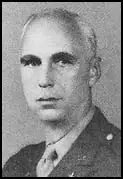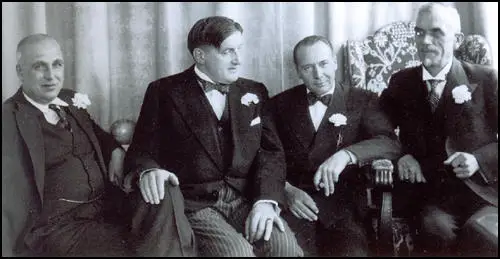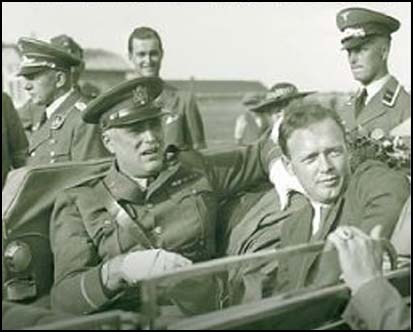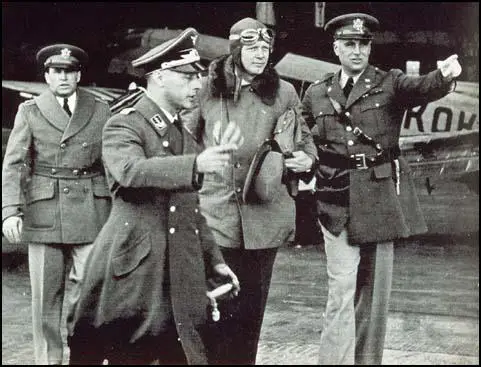Truman Smith

Truman Smith was born in West Point on 25th August, 1893. His father was a soldier but he was killed in action at Cebu in February, 1900. He was educated at schools in Stamford before arriving at Yale University (1912–15). He was a graduate student at Columbia University (1915-16).
In 1917 he was commissioned Second Lieutenant in the United States Army. During the First World War he served on the Western Front and took part in the offensive at Meuse-Argonne. He received the Silver Star and was promoted to the rank of Major.
After the war he served as assistant military attaché in Berlin. In 1919, Ernst Hanfstaengel, who had been living in the United States, met Smith, who told him that Adolf Hitler was a rising star. Hanfstaengel took his advice and went to hear him speak at a National Socialist German Workers Party (NSDAP) meeting. Hanfstaengel later recalled: "In his heavy boots, dark suit and leather waistcoat, semi-stiff white collar and odd little moustache, he really did not look very impressive - like a waiter in a railway-station restaurant. However, when Drexler introduced him to a roar of applause, Hitler straightened up and walked past the press table with a swift, controlled step, the unmistakable soldier in mufti. The atmosphere in the hall was electric. Apparently this was his first public appearance after serving a short prison-sentence for breaking up a meeting addressed by a Bavarian separatist named Ballerstedt, so he had to be reasonably careful what he said in case the police should arrest him again as a disturber of the peace. Perhaps this is what gave such a brilliant quality to his speech, which for innuendo and irony I have never heard matched, even by him. No one who judges his capacity as a speaker from the performances of his later years can have any true insight into his gifts."
Truman Smith continued to take a close interest in Hitler. On 25th November, 1922 he said a report to Washington: "The most active political force in Bavaria at the present time is the National Socialist Labour Party. Less a political party than a popular movement, it must be considered as the Bavarian counterpart to the Italian fascisti It has recently acquired a political influence quite disproportionate to its actual numerical strength. Adolf Hitler from the very first has been the dominating force in the movement, and the personality of this man has undoubtedly been one of the most important factors contributing to its success... His ability to influence a popular assembly is uncanny. In private conversation he disclosed himself as a forceful and logical speaker, which, when tempered with a fanatical earnestness, made a very deep impression on a neutral listener."
Truman Smith returned to the United States and in 1928 he completed a course at the Command and General Staff School at Fort Leavenworth in 1928. He then became an instructor at the U.S. Infantry School until 1932 when he attended the Army War College. He then served with the 27th infantry regiment in Hawaii.
In 1935 Truman Smith was appointed as military attaché in Berlin. He was told that his chief responsibility was "to report to Washington about the growth of the German army, including the development of new weapons and new battle tactics." Smith came to the conclusion that the American Ambassador to Germany, William Dodd was not interested in military matters; and did not give him the support he expected. However, Dodd did share Smith's views on the Jews in Germany. He wrote in his diary: "The Jews had held a great many more of the key positions in Germany than their numbers or talents entitled them to." Dodd also wrote about a meeting with Hitler where he explained what the United States had done about the Jews in public life: "I explained to him (Hitler) that where a question of over-activity of Jews in university or official life made trouble, we had managed to redistribute the offices in such a way as to not give great offense."
During this period Truman Smith worked closely with U.S. Army military intelligence and became friendly with important officers such as General Werner von Blomberg. His biographer claims that "Truman Smith... from this unique vantage point he observed and reported Germany's transformation into a war-oriented economy and the rearmament of her army and air forces. Smith was one of the first to call attention to Hitler's placing the Reich on a war footing and his series of reports on the astonishing capabilities of the Luftwaffe became the focus of considerable controversy."

In 1936 Truman Smith had a meeting with Air Minister, Hermann Goering, and his chief assistant, State Secretary Erhard Milch, and asked them if they would allow Charles A. Lindbergh to visit a number of air installations in Germany. They agreed and invited Lindbergh to visit Nazi Germany. Lindbergh wrote to his mother about the proposed trip: "Comparatively little is known about the present status of Aviation in Germany, so I am looking forward, with great interest, to going there. Even under the difficulties she has encountered since the war, Germany has taken a leading part in a number of aviation developments, including metal construction, low-wing designs, dirigibles, and Diesel engines. If it had not been for the war she would probably have produced a great deal more. On the other hand, if it had not been for the war it is doubtful whether aviation would be as far advanced as it is today."
According to A. Scott Berg, the author of Lindbergh (1998): "Charles followed a rigid military schedule, a succession of inspections. Accompanied by an assistant air attaché, Theodore Koenig, Lindbergh visited the Tempelhof civil airport, where he was permitted to pilot a Junkers (JU) 52, the Luftwaffe's standard bombardment plane, and the Hindenburg, a large four-motored experimental passenger plane. He spent a day with the Richthofen Geschwader (Wing), the elite fighter group of the Luftwaffe. One day he visited two Heinkel factories and saw their latest dive-bomber, medium bomber, fighter, and observation planes-all, Lindbergh found, of superb design. He spent another day at the Junker works at Dessau, where he saw their new JU 210 engine, a liquid-cooled engine far more advanced than he or Koenig had expected, and a JU 86, a low-wing, all-metal medium bomber already in mass production. Lindbergh spent another day at the German air research institute of Adlershof, where the scientists spoke freely of their work until he steered the conversation to the subject of rockets."
Lindbergh argued that "Europe, and the entire world, is fortunate that a Nazi Germany lies, at present, between Communistic Russia and a demoralized France. With the extremes of government which now exist, it is more desirable than ever to keep any one of them from sweeping over Europe. But if the choice must be made it can not be Communism." Lindbergh believed that the Germans were "especially anxious to maintain a friendly relationship with England" and that they had no "intention of attacking France for many years to come, if at all," and they seemed "to have a sincere desire for friendly relations with the United States, but of course that is much less vital to them."
Anne Lindbergh was also impressed with what Adolf Hitler had achieved. She wrote to her mother on 5th August, 1936, "I am beginning to feel, Hitler is a very great man, like an inspired religious leader - and as such rather fanatical - but not scheming, not selfish, not greedy for power, but a mystic, a visionary who really wants the best for his country and on the whole has rather a broad view." She argued that "strictly puritanical view at home that dictatorships are of necessity wrong, evil, unstable and no good can come of them - combined with our funny-paper view of Hitler as a clown - combined with the very strong (naturally) Jewish propaganda in the Jewish owned papers."

On 20th August, 1936, Charles A. Lindbergh wrote a letter of thanks to General Hermann Goering: "It is always a pleasure to see good workmanship combined with vision in design and great technical ability. I have never been more impressed than I was with the aviation organizations I saw in Germany. I believe that the experimental laboratories which are being constricted will undoubtedly contribute very greatly to the progress of aviation throughout the world."
Major Truman Smith thanked Lindbergh for visiting Nazi Germany: "I don't believe anybody else in the world could have succeeded in doing what you did, pleasing everybody, both the German public and the American public." After the visit, Truman Smith observed, "Captain Koenig found himself in a privileged position in the attaché corps. In the ensuing twelve months, he visited more factories and airfields than any other foreign attaché, with the possible exception of the Swedes and the Italians."
When he arrived back in the United States he told his friends that he was impressed with what Hitler had achieved in the three years he had been in power. He told Harry Davison: "He is undoubtedly a great man, and I believe has done much for the German people. He is a fanatic in many ways, and anyone can see that there is a certain amount of fanaticism in Germany today. It is less than I expected, but it is there. On the other hand, Hitler has accomplished results (good in addition to bad), which could hardly have been accomplished without some fanaticism." To another friend he wrote: "While I still have many reservations, I have come away with a feeling of great admiration for the German people. The condition of the country, and the appearance of the average person whom I saw, leaves with me the impression that Hitler must have far more character and vision than I thought existed in the German leader who has been painted in so many different ways by the accounts in America and England." He told Harry Guggenheim: "There is no need for me to tell you that I am not in accord with the Jewish situation in Germany" but the "undercurrent of feeling" was "that the German Jews had been on the side of the Communists."
In October 1937 Lindbergh made a second visit. Lindbergh and Truman Smith became the first Americans to visit the Focke-Wulf factory in Bremen, where the "Germans demonstrated a model of a flying machine (a helicopter) that landed and took off vertically and was able to hover without any apparent movement; it could also fly backward or forward with good maneuverability in turning." Lindbergh later recalled: I have never seen a more successful demonstration of an experimental machine."

Ernst Udet of the Luftwaffe was authorized to show Lindbergh the Rechlin-Lärz Airfield air testing station in Pomerania. Truman Smith wrote: ""This was one of the most secret establishments in Germany, and so far as was then known, foreign attaches were barred." Lindbergh became the first American to examine in detail the Messerschmitt (ME) 109, the Luftwaffe's leading single-engine fighter, as well as the Dornier (DO) 17, its latest light bomber-reconnaissance airplane. He was also told about the development of the Messerschmitt 110, a twin-engined fighter with 1200 h.p. Daimler-Benz engines.
As a result of this visit Truman Smith wrote a report, "General Estimate (of Germany's Air Power) of November 1, 1937." The four-page survey included the following passage: "Germany is once more a world power in the air. Her air force and her air industry have emerged from the kindergarten stage. Full manhood will still not be reached for three years." He said that Germany had already outdistanced France in its technical development and had all but closed the gap on Great Britain. "A highly competent observer (Charles Lindbergh) estimated that if the present progress curves of (America and Germany) should continue as they have in the past two years, Germany should obtain technical parity with the USA by 1941 or 1942." Despite his report, Congress cut rather than increased War Department requests for appropriations for the Army Air Corps.
In November, 1938, Truman Smith arranged for Charles A. Lindbergh to visit Nazi Germany again. Great controversy was caused when Lindbergh received a medal from Hermann Goering. Lindbergh later claimed that he had no idea it was going to happen: "Goring was the last to arrive. I was standing at the back of the room when lie came through the door, wearing a blue Luftwaffe uniform of new design. He seemed less stout than when I last saw him. Heads turned and conversation dropped as Ambassador Wilson advanced to meet his guest of honor. I noticed that Goring carried a red box and some papers in one hand. When he came to me he handed me the box and papers and spoke several sentences in German. I knew no German but I soon learned that he had presented me with the Order of the German Eagle, one of the highest decorations of the government by order of der Fuhrer", he said."
Lindbergh was roundly condemned for accepting the medal. The Secretary of the Interior, Harold Ickes, asserted that anyone who accepts a decoration from Germany also "forfeits his right to be an American". The New Yorker on 26th November, 1938, commented: "With confused emotions we say goodbye to Colonel Charles A. Lindbergh, who wants to go and live in Berlin, presumably occupying a house that once belonged to Jews."
When they returned to the United States both men were accused of being Nazi sympathizers. This view was re-inforced by Smith's support for the 1937 Neutrality Act and his opposition to American involvement in the Second World War. According to Smith's biographer: "Both men were denounced in the press as fascists and henchmen of the Third Reich. The accuracy of the Lindbergh-Smith reports were questioned and dismissed as defeatist propaganda." General George C. Marshall defended Smith and in 1939 appointed him as his personal adviser.
After the war he sought the Republican Party nomination for Connecticut's 4th congressional district but lost to the Hollywood actor, John Davis Lodge. During the campaign he advocated rearming Germany as a counterbalance to Soviet power. Smith was also military aide to the governor of Connecticut.
Truman Smith died on 3rd October, 1993.
Primary Sources
(1) Truman Smith, report sent to Washington (25th November, 1922)
The most active political force in Bavaria at the present time is the National Socialist Labour Party. Less a political party than a popular movement, it must be considered as the Bavarian counterpart to the Italian fascisti It has recently acquired a political influence quite disproportionate to its actual numerical strength.
Adolf Hitler from the very first has been the dominating force in the movement, and the personality of this man has undoubtedly been one of the most important factors contributing to its success... His ability to influence a popular assembly is uncanny. In private conversation he disclosed himself as a forceful and logical speaker, which, when tempered with a fanatical earnestness, made a very deep impression on a neutral listener.
(2) A. Scott Berg, Lindbergh (1998)
Shortly before the Lindberghs had moved abroad, the United States Army had appointed Major Truman Smith - a Yale graduate and career officer with a longtime interest in German history - to be Military Aattaché to the American Embassy in Berlin. The chief responsibility of the handsome six-foot-four career soldier was "to report to Washington about the growth of the German army, including the development of new weapons and new battle tactics." Smith was soon alarmed, for he recognized that Germany was erecting a new military force in the air-the Luftwaffe - and that American intelligence had gathered little information about it. To make matters worse, the Ambassador - an academician, William Dodd - displayed little interest in military matters; and Washington, accordingly, did not appreciate the magnitude of the German buildup. An infantryman, Smith realized he needed an aviation expert to help him size up the Luftwaffe.
One Sunday morning in May 1936, Smith's wife pointed out a squib on the front page of the Paris Herald about Charles Lindbergh's having just visited a French airplane factory. It occurred to Smith that Lindbergh might be just as willing to inspect German air factories.
(3) Charles A. Lindbergh, Autobiography of Values (1976)
In the early part of June 1936, I received a letter from the American Military Attache in Berlin, Major Truman Smith, asking me to fly to Germany to help him evaluate developments he had been watching in the Luftwaffe. Major Smith also transmitted an invitation from General Hermann Goring. As I learned later, the U.S. State Department approved this mission. I accepted. I had for many years looked forward to visiting Germany; doing so, I could better evaluate the trends under way in Europe. As a Reserve officer, I wanted to assist the War Department in any way I could...
I gained the impression that Germany was looking eastward, militarily, yet it was obvious that bombing planes would not find the Maginot Line a formidable obstacle should they wish to cross it. The Germans knew that France was deficient in both defensive and retaliatory air power.
Goring invited us to his Berlin home for lunch. There we sat with German and American officers and their wives at a richly decorated table in a room lined with mirrors and carved madonnas "borrowed" from German museums. After the meal was over, Goring, white-uniformed, bemedaled, and gold-braided, escorted me to a side table, where he opened a photograph album. "Here are our first seventy," he said, turning the pages. Each page contained a picture of a military airfield. From the inspection trips I had made through German factories, I knew warplanes were being built to fill those fields.
Obviously Germany was preparing for war on a major scale with the most modern equipment. The Nazi government also obviously wanted to impress America with its rapidly growing strength. Before leaving Berlin I assisted Major Smith in preparing a special report for the War Department in Washington. Germany was forging ahead of the United States in aeronautical research and production facilities, we declared. The performance of their fighting and light-bombing types of aircraft was especially notable.
I knew theoretically what modern bombs could do to cities. At the same time, experiences in war games had convinced me that claims for the effectiveness of both ground and air defense were tremendously exaggerated. In Nazi Germany, for the first time, war became real to me. The officers I met were not preparing for a game. Their discussions gave me a sense of blood and bullets, and I realized how destructive my profession of aviation might become.
The organized vitality of Germany was what most impressed me: the unceasing activity of the people, and the convinced dictatorial direction to create the new factories, airfields, and research laboratories. Militarism was pervasive-streets were full of uniforms and banners. It was such a contrast to the complacent and tranquil life in England from which we had come. Germany had the ambitious drive of America, but that drive was headed for war.
Cruising back to England after our visit was over, I found that Nazi Germany was forcing a reorientation of my thought. For many years aviation had seemed to me primarily a way of bringing peoples of the world together in commerce and peace. The accounts of air combats I had read as a young Minnesota wartime farmer had long been pocketed away in memory. My year at cadet school, followed by service in Reserve and National Guard squadrons, was hardly more than a passing bow to the rejected god of war. I had thought and talked about aircraft overcoming surface barriers of earth for the benefit of man's relationship to man. Now I began to think about the vulnerability of men to aircraft carrying high-explosive bombs.
